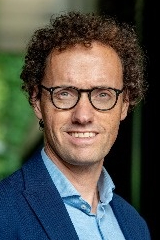KNAW appoints Mladen Popović and René Veenstra as members

Professor Mladen Popović and Professor René Veenstra have been appointed members by the Royal Netherlands Academy of Arts and Sciences (KNAW). The KNAW elected 17 new members: 16 full members and one foreign member. The approximately 600 members of the KNAW are leading scientists from all disciplines. Membership is for life. On Monday 30 September, the new Academy members will be installed.

About the research of Mladen Popović
Mladen Popović is professor of Old Testament and Ancient Judaism.
Mladen Popović enjoys a worldwide reputation as an expert on the Dead Sea Scrolls, discovered in desert caves near Qumran, Israel, on the northern shore of the Dead Sea. These ancient manuscripts contain passages from the Bible we know today. Popović works with other researchers on combining handwriting analysis, artificial intelligence and scientific methods such as carbon-14 dating to determine, with previously unattainable precision, the dates of the manuscripts and even to detect differences between the individual authors. Using these techniques, he has managed to situate Qumran’s pre-Christian, Jewish community within the literary and philosophical cultures of the Hellenistic world and the Roman Near East. His approach has led to a paradigm shift in palaeography, Biblical scholarship and the history of Judaism, and may also be useful in other fields of historical science.

About René Veenstra's research
René Veenstra is professor of sociology with a special interest in social development.
René Veenstra has pioneered the study of prosocial and antisocial behaviour and focuses in particular on the role of social networks and norms. He developed an innovative perspective on bullying that views this behaviour not as an isolated problem of individuals but as a dynamic that emerges in social networks in which everyone can play a role. He also showed that children who bully others are not simply maladjusted but are often acting strategically to gain status and affection. This reframing has led to a new approach to anti-bullying that focuses on changing the prevailing social norms rather than punishing the bullies. Veenstra was involved in introducing and evaluating an effective anti-bullying programme (KiVa) in the Netherlands and played a vital role in developing longitudinal studies on adolescent social development. He devotes enormous energy to sharing his knowledge of social networks and the mechanisms of bullying with teachers, parents, children and a wider audience. His research has made a significant contribution to promoting positive social interactions and has enormous social relevance.
| Last modified: | 17 May 2024 2.51 p.m. |
More news
-
17 March 2025
Liekuut | The high price of conflicts
According to Carsten de Dreu, Professor of Foundations of Cooperation and Social Organization at the University of Groningen, a lot can be learned from conflicts.
-
10 March 2025
Science for Society | Memory Lab for higher marks
Learning facts at school is something hardly anyone likes. The day before a test, pupils cram as many words or names as possible into their heads, only to hopefully remember them the next morning and then forget them again after the test.
-
05 March 2025
Women in Science
The UG celebrates International Women’s Day with a special photo series: Women in Science.
